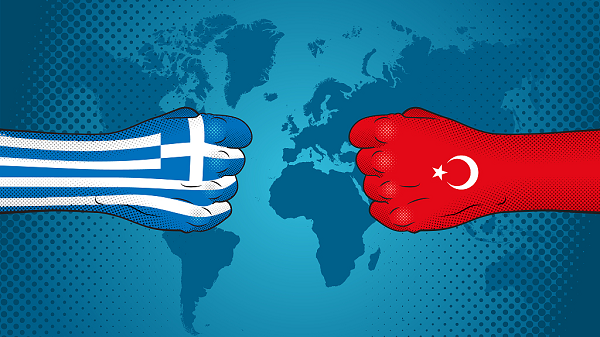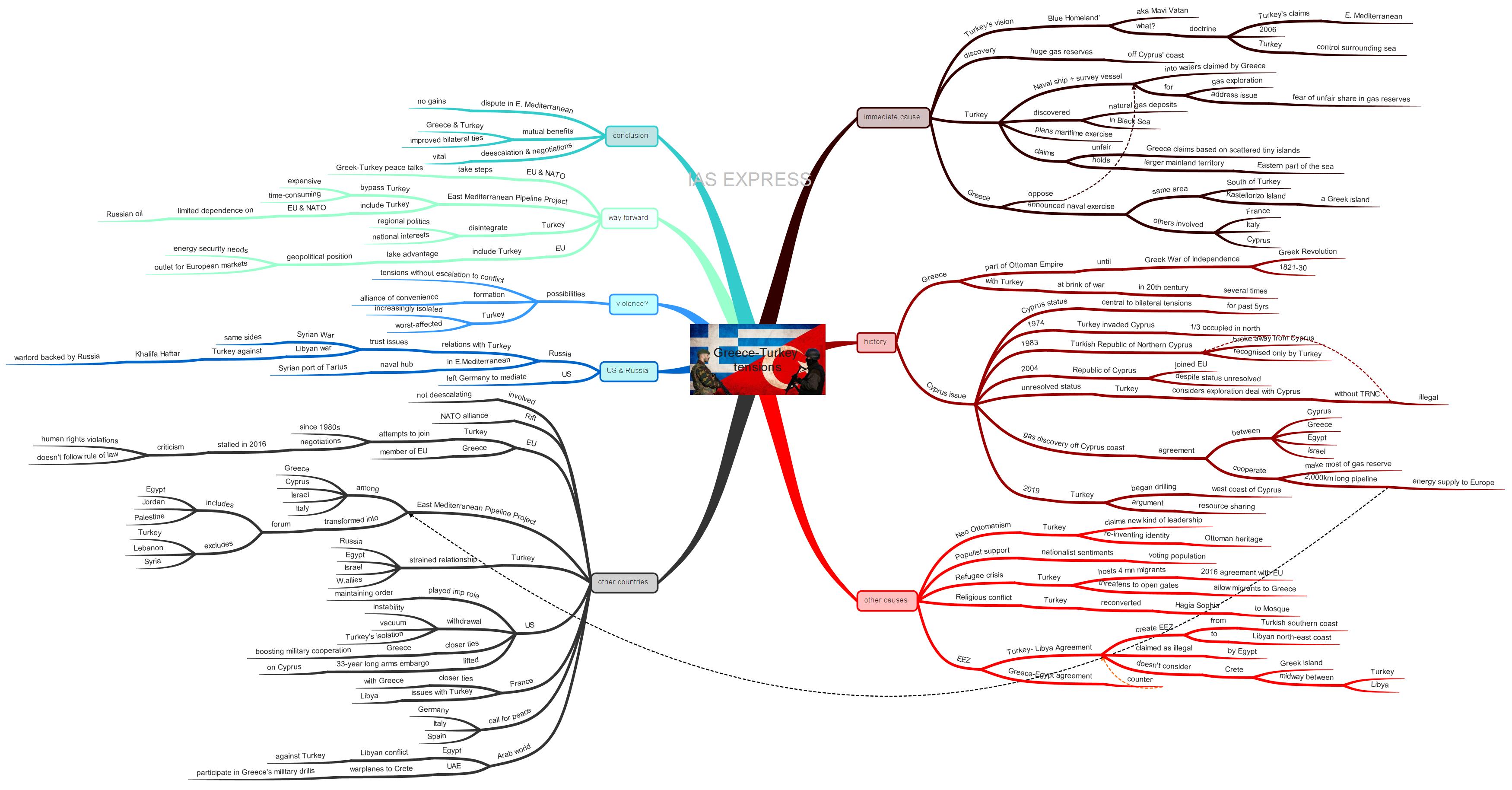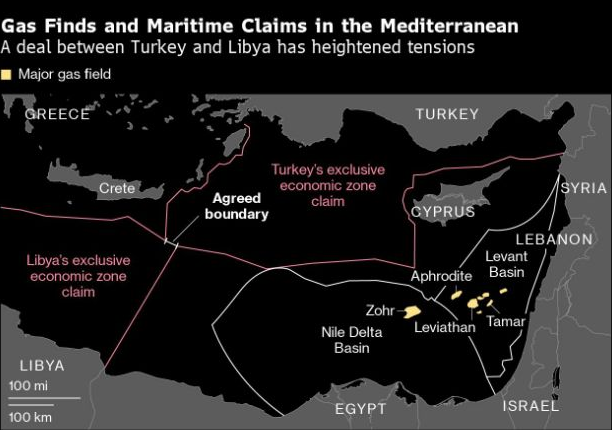Greece-Turkey Tensions – History, Challenges, Way Ahead

From Current Affairs Notes for UPSC » Editorials & In-depths » This topic
IAS EXPRESS Vs UPSC Prelims 2024: 85+ questions reflected
The relations between Greek and Turkish states have been marked by alternating periods of mutual hostility and reconciliation ever since Greece became independent from the Ottoman Empire in 1830. The two NATO allies’ relations are currently marred by increasing military presence of both countries at the Eastern Mediterranean, where both claim oil-and-gas exploration rights.
What are the immediate reasons for the current escalation of the bilateral relations?
- Turkey’s recent activities in the Mediterranean – in pursuance of the grand vision of ‘Blue Homeland’– is the immediate reason for the current escalations.
- ‘Blue Homeland’ or ‘Mavi Vatan’ is an expression that refers to Turkey’s claims over the eastern Mediterranean region. The doctrine was announced in 2006. It is a Turkish plan to achieve control in the seas surrounding it.
- It is considered as Turkey’s way of resorting to disruptive activities to coerce other players in the region to achieve its objectives.
- In recent years, huge gas reserves have been discovered off the coast of Cyprus.
- In August, Turkey had sent in Oruc Reis Survey Vessel, accompanied by a small navy armada, into the waters claimed by Greece. The purpose was gas exploration and the reason was fear that it won’t get a fair share in the region’s natural gas.
- Recently, Turkey announced that it has made its biggest ever discovery of natural gas deposits in the Black Sea.
- Apart from this, the Turkish defence ministry announced plans to conduct maritime exercises, which also involves a US vessel, in the region.
- Greece perceives Turkish gas exploration as illegal.
- In response, Greece announced its own naval exercise in the same area located south of Turkey and the Kastellorizo Island (a Greek Island).
- France and Italy are to take part in this naval exercise along with Greece and Cyprus. In response, Turkey has warned that any attack would invite retaliation.
- Turkish officials are of the stand that Greece’s demand based on the scattering of tiny islands is unfair because Turkey holds a larger mainland territory in the eastern part of the sea.
What are the past relations between the two countries?
- Turkey and Greece are historical enemies in the region. Their enmity predates the Turkish Republic’s establishment itself. Greece was historically a part of the Ottoman Empire until the Greek War of Independence (Greek Revolution) in 1821-30.
- They have been at the brink of war with each other several times in the 20th century.
- 1996 was the last time when the enmity between the two countries almost escalated into a war. This was due to tensions over uninhabited islets in the Aegean Sea.
- They have been in conflict over everything from the origins of dessert baklava (a sweet pastry dish) to historical atrocities.
Cyprus issue:
- Over the past 5 years, the status of Cyprus has taken the centre spot in the Turkey- Greece conflict.
- In 1974, Turkey invaded Cyprus and occupied a third of the island in the north. This was triggered by a military coup that was backed by Greece.
- The invasion triggered an exodus of the Greek Cypriots.
- In 1983, a breakaway of Cyprus, the Turkish Republic of Northern Cyprus (TRNC), was declared. The TRNC is recognised only by Turkey.
- Despite the divided status, the Republic of Cyprus joined the EU bloc in 2004.
- This unresolved status of the island is a key reason why Turkey considers any energy exploitation deal signed by Cyprus as illegal unless it involves the TRNC.
- On the other hand, Greece considers Turkey’s exploration activities near Cyprus to be illegal.
- This was compounded by the discovery of huge gas reserves in the waters near Cyprus in recent years. This prompted Cyprus, along with Greece, Egypt and Israel to work together to make the most out of the finds.
- As part of their agreement, a 2,000km long pipeline is to take the energy supplies to Europe.
- In 2019, Turkey began drilling off the west coast of Cyprus for it has argued that the island’s natural resources must be shared.
- Licences have been issued to Turkish Petroleum to drill in the eastern Mediterranean, including in areas near Greek islands – Rhodes and Crete.
What are the other factors that are worsening bilateral relations?
Neo Ottomanism:
- A power-shift has been taking place in the eastern Mediterranean and Turkey has been trying to claim a new kind of leadership. While Attaturk tried to give Turkey a secular face, the current leadership is re-inventing its identity along the lines of its Ottoman heritage.
- Greece has criticised Turkey as advancing a ‘neo-Ottoman’ strategy in the eastern Mediterranean region.
- It has accused Turkey as attempting ‘to implement expansionist aims against its neighbours and allies.’
- The Turkish president has even been dubbed a ‘modern Sultan’.
Populist support:
- The policy choices of both Turkey and Greece is not solely due to historical rivalries. The tensions serve as a tool to trigger nationalist sentiment among their voting population.
- Hence militarising the issues helps them win over their domestic political support.
- Turkey’s ‘strong-arm approach’ enjoys bipartisan support back home. Even the main opposition party supports the Mediterranean drilling program.
- In addition to this, ‘maximalist approaches’ serve as a distraction from more pressing issues like the weakening economy and the pandemic.
Refugee crisis:
- Turkey is a linchpin in Europe’s handling of the refugee crisis.
- The country hosts around 4 million migrants and refugees as a part of its 2016 agreement with the EU.
- Turkey has been threatening to ‘open the gates’ to allow a flood of asylum seekers to flow into Greece. In February, the Turkish president even made good on these threats.
- The EU has accused Turkey of using refugees as a ‘bargaining tool’.
- On the other hand, Athens has been facing criticism from human rights groups for its ‘hardline response’ in this issue – sometimes even using violence against the refugees.
Religious conflict:
- Apart from the historical issues, there is a religious side to the conflict.
- In July, Turkey re-converted Hagia Sophia in Istanbul into a mosque.
- This UNESCO World Heritage Site was originally a Byzantine church but was converted into a mosque in the Ottoman period. Attaturk converted it into a museum in pursuance of a secular Turkey.
- It is one of the most contested religious buildings in the world and greatly revered by centres of Orthodox Christianity- like Greece and Russia.
Establishment of EEZ:
- In November last year, Turkey signed a deal with Libya for the creation of an EEZ from the Turkish southern coast to Libyan north-east coast.
- Egypt holds that this is illegal. Greece pointed out that the agreement has failed to take Crete into account. This Greek island falls midway between Turkey and Libya.
- In August, the two countries hit back with their own deal to establish an EEZ that would ‘cancel out’ the Turkey- Libya Agreement.
Which are the other countries involved in the issue?
- Other countries have been drawn into this long-running conflict between Greece and Turkey. This involvement has only encouraged more brinkmanship rather than de-escalation.
- A noteworthy feature of the conflict is that both the countries are part of the NATO alliance, creating an awkward military situation in which 2 NATO allies are at conflict with each other and a rift is forming in the regional alliance.
- Another aspect is the role of the EU in the conflict. Turkey has been attempting to join the EU since the 1980s but the negotiations have been stalled since 2016 over criticism of human rights violation and its shortcomings in the implementation of the rule of law. Turkey has largely given up trying to join the bloc. In contrast, Greece remains a member of the EU.
- In view of the energy reserves in the region, several regional alliances have cropped up. An agreement on the East Mediterranean Pipeline Project among Greece, Cyprus, Israel and Italy has transformed into a Forum with the inclusion of Egypt, Jordan and even Palestine. However, it excluded Turkey, Lebanon and Syria.
- Turkey’s erratic foreign policy has damaged its relations with several countries in the region like Egypt, Israel, Russia and also its western allies.
- A key foreign player in the region is the USA. It played a crucial rov in maintaining order in the region. However, with its withdrawal, instability and vacuum have been created. This has largely isolated Turkey. In addition to this, it has recently shifted its alliance towards Greece (shifting alliance from one NATO member to another) by lifting a 33-year long arms embargo on Cyprus. Its beefed-up military cooperation with Greece is seen as a message to Turkey.
- France, a member of both the NATO and the EU, has sided with Greece in this issue. It has pre-existing issues with Turkey vis-a-vis Libya. The French President has termed Turkey’s activities in Libya as ‘criminal’. He had dispatched fighter jets and a naval frigate to support Greece.
- Other EU members like Germany, Italy and Spain have favoured a more conciliatory approach in the conflict.
- Adding to the fire, Egypt has threatened to intervene in the Libyan conflict against Turkey. Egypt is also siding with the Greek for establishing an EEZ countering Turkey- Libya EEZ.
- Even the Arab World has involvement in the issue. The UAE has sent warplanes to Crete to participate in Greece’s military drills.
What are the US’ and Russia’s stand on this issue?
- Turkey and Russia are on the same side in the Syrian War. In contrast to this, Turkey has intervened in the Libyan Civil Conflict against Khalifa Haftar, a warlord backed by Russia. This has earned the distrust of the Russians.
- Though Russia claimed that it was ready to help mediate in any talks on Eastern Mediterranean, it is deeply entrenched in the disputed region where the Turkish government announced the biggest ever gas find.
- The US had warned last year that Moscow is in the process of turning the eastern Mediterranean into one of the world’s most militarized zone by building a naval hub at the Syrian port of Tartus.
- It was also reported that the Russian Navy has gathered 9 military vessels between Cyprus and Syria.
- The US administration, for its part, urged the two NATO allies to commit to dialogue.
- Although the US warship arrived at the Greek island of Crete, the White House largely left Germany to mediate the crisis.
- This shows Washington’s unwillingness to be dragged into the Mediterranean politics.
Is there a possibility of the crisis turning violent?
- The recent Mediterranean crisis is less about the oil and more about the claim.
- Turkey is trying to change the status quo in the eastern Mediterranean. However, its economy is in shambles and the international support for it is virtually zero, as no country trusts it.
- Due to the lack of a permanent alliance with any of the countries, the current strategy followed by Ankara is to maintain a degree of tension with Greece without escalating it to a major conflict.
- Greece too is not inclined to escalate tensions, leading to both sides voicing the need for mediation.
- Meanwhile, other NATO countries are taking on each other, with no solid strategy to reduce the bilateral tensions between Greece and Turkey.
- The EU is preoccupied with the pandemic control and has less appetite for conflict at this point.
- The stalling of Turkey’s membership to the EU has made it difficult for the member countries to provide incentives for compromise necessary to override the nationalist sentiments in Turkey.
- Taking these challenges into consideration and the need to prevent escalation of the conflict by all sides, there is a possibility that an alliance of convenience will be formed.
- Regardless, Turkey will face the worst of the losses in this dispute, while also being increasingly isolated in the near future.
What can be the way forward?
- It is vital that the international players, especially the EU and the NATO, instead of dividing among themselves and taking sides, must come together to pave the way for cooperation among the disputing countries.
- Cooperation is the best and cheapest way for all regional countries to ensure inclusive growth of all.
- Greece and allies are planning on setting up a pipeline that bypasses Turkey. This will be an expensive and time-consuming
- Including Turkey in the Mediterranean alliance would ensure that NATO and the EU need to depend less on Russia for natural gas.
- Turkey, for its part, must disintegrate its regional politics from its strategic interests so as to address the issue of international isolation.
- The EU can take steps to include Turkey as one of its members, given its geopolitical position that enables securing energy needs of the region and the ability to provide an outlet for the European markets.
- All countries in the region, including Turkey, needs the support of neighbours for commercialising and transporting the natural gas resources to the market.
- Negotiations, though difficult given the political environment in the region, is still possible through a common platform.
Conclusion
No country in the region would benefit from the violent escalation of the disputes at the Eastern Mediterranean. Greece and Turkey, being neighbours and NATO allies, would be mutually benefited if they improve their bilateral relations. De-escalation and negotiations for ensuring common interests can pave way for security, growth and peace in the region.
Practice question for mains:
Turkey’s policy of neo-Ottomanism is more to do with regional politics rather than national interests. Elucidate. (250 words)
If you like this post, please share your feedback in the comments section below so that we will upload more posts like this.







